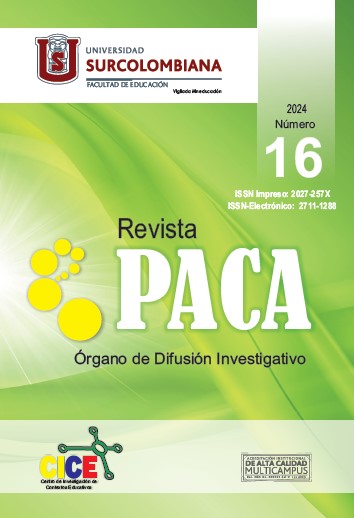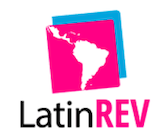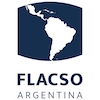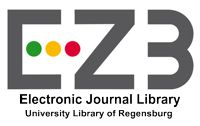Pedagogy of Mother Earth in the gestation and childbirth of the Nasa Indigenous Woman
Pedagogía de la Madre Tierra en la gestación y parto de la mujer Indígena Nasa
##plugins.themes.bootstrap3.article.main##
Pregnancy is made up of universal physiological events, independent of geographical, cultural and religious location. In indigenous communities there are multiple factors that limit the participation of pregnant women in health services, which merits investigation. Objective: Co-construct the elements for a pedagogical strategy in health from the recovery of ancestral
knowledge for pregnant women from an indigenous community in Huila from the Pedagogy of Mother Earth. Methodology: Community-based participatory research (CBPR) with qualitative focus carried out during 2021 and 2022. The study population was a community from the Páez indigenous reservation (Íquira, Huila-Colombia). Non-probabilistic sampling made up of pregnant women, midwives and representatives of the health service with whom focus groups were held. Results: For the Nasa
woman, pregnancy represents a seed, a new life and the beginning of a cycle; the gestation process is seen as an opportunity for growth, learning and survival for the community. Own beliefs and customs are applied prior to conception and until childbirth, aimed at a healthy, calm, pain-free pregnancy in permanent connection with mother earth. Conclusions: For the construction of a pedagogical strategy in health in harmony with mother earth, elements such as the recognition of individual and collective history, the accompaniment of the couple and the family, food and listening to the language must be taken into account of the body as transverse axes and the recognition of the midwife and the knowledgeable as representative actors in the process.
Downloads
##plugins.themes.bootstrap3.article.details##
Amaya Castellanos, C. I., Shamah Levy, T., Escalante Izeta, E. I., Turnbull Plazas, B., & Núñez Urquiza, R. M. (2019). Empoderamiento y búsqueda de atención en salud: un factor ignorado de la mortalidad materna en una comunidad indígena mexicana. Global Health Promotion, 0(0), pp. 1–9. https://doi.org/10.1177/1757975918821052
Araújo Salas, B. L. (2018). Costumbres en torno al parto en la comunidad nativa Camisea del pueblo Matsigenka, Cusco, Perú. Investigaciones Sociales, 21(39), pp. 27–40. https://doi.org/10.15381/is.v21i39.14659
Banda Pérez, A. D. J., Díaz Manchay, R. J., Álvarez Aguirre, A., Casique Casique, L., & Rodríguez Cruz, L. D. (2018). Cuidados culturales durante el período posparto en las mujeres indígenas: ACC CIETNA: Revista de La Escuela de Enfermería, 5(1), pp. 74–83. https://doi.org/10.35383/cietna.v5i1.6
Benavides Cortés, A., García Ramírez, C., & Guido Guevara, S. (2020a). Crianza urbana y territorio ancestral: Pueblos indígenas Embera-Katío y Nasa en Bogotá. Revista Alethia, 12, pp. 37–60.
Benavides Cortés, A., García Ramírez, C., & Guido Guevara, S. (2020b). Crianza urbana y territorio ancestral: Pueblos indígenas Embera-Katío y Nasa en Bogotá. Revista Alethia, 12, pp. 37–60.
Benavides, J. M. (2014). Atención de la salud y la enfermedad en comunidades nasa: prácticas, significados y desencuentros, p. 116.
Bernal Romero, A. J., & Hernández Robayo, B. P. (2021). Cuidados de la enfermería trasncultural en el embarazo de la mujer indígena. Universalud, 10, pp. 58–66.
Castillo Santana, P. T., Vallejo Rodríguez, E. D., Cotes Cantillo, K. P., & Castañeda Orjuela, C. A. (2017). Salud materna indígena en mujeres Nasa y Misak del Cauca, Colombia: Tensiones, subordinación y diálogo intercultural entre dos sistemas médicos. Saude e Sociedade, 26(1), pp. 61–74. https://doi.org/10.1590/S0104-12902017168743
Colmerares E, A. M. (2017). Investigación- acción participativa: una metodología del conocimiento y la acción. Voces y Silencios: Revista Latinoamérica de Educación, 3(1), pp. 37–47. https://doi.org/10.1007/978-3-319-68548-9_4
Cornejo, J., & Barros, P. (2015). Enfoque integrativo multidimensional e intervenciones mente-cuerpo en el manejo del dolor crónico: el caso de la una adulta mayor. Revista Hospital Clínico Universidad De Chile, 26(1), pp. 125–131.
Cruz, I. (2018). La Fuerza del Ombligo, Pedagogía de la Vida. Ciencia e Interculturalidad, 23(2), pp. 174–192. https://doi.org/10.5377/rci.
v23i2.6576
De Sousa Santos, B. (2018). Construyendo las epistemologías del sur. En Construyendo las epistemologías del sur: Vol. I (CLACSO. Fu, pp. 231–264).
Gallegos, C. A., Waters, W. F., & Kuhlmann, A. S. (2017). Discourse versus practice: Are traditional practices and beliefs in pregnancy and childbirth included or excluded in the Ecuadorian health care system? International Health, 9(2), pp. 105–111. https://doi.org/10.1093/inthealth/ihw053
Garzón, L. P., & Rengifo Salgado, E. (2021). Saberes tradicionales sobre el uso de plantas medicinales para la salud femenina reproductiva en comunidades indígenas amazónicas de la zona fronteriza Perú - Colombia. ETHNOSCIENTIA.
https://doi.org/http://dx.doi.org/10.18542/ethnoscientia.v6i3.10662
Green Stócel, A. (2006). Educación Superior desde la Madre Tierra, pp. 1–9.
Hernández Sampieri, R., Fernández Collado, C., & Baptista, L. P. (2014). Metodología de la investigación. En Mc Graw Hill (Sexta Edic.).
Linconln, Y., & Guba, E. (1985). Naturalistic Inquiry (Sage Publi, Issue June). https://doi.org/10.4135/9781412986281.n232
Maciel Vilchis, A. del C., Rojas Carbajal, F., & Ángeles Ávila, G. (2015). Percepción de la embarazada sobre la atención brindada en el control prenatal, pp. 9–18.
Martín Vicente, P. (2017). Los estudios de salud materna intercultural en Bolivia: De la teoría a la praxis. Boletín Americanista, 2017(74), pp. 91–111. https://doi.org/10.1344/BA2017.74.1006
Martínez-Álvarez, E. (2019). Elementos para la construcción de un protocolo de transcripción de entrevistas y grupos focales. En Universidad Nacional de Colombia, p. 7.
Secretaría de Salud de Íquira (Huila). (2020). Análisis de Situación de Salud, Colombia 2022. }
Ministerio de Salud y Protección Social. (2018). Resolución 3280 de 2018. Por medio de la cual se adoptan los lineamientos técnicos y operativos de la Ruta de Atención para la Promoción y Mantenimiento de la Salud y la Ruta Integral de Atención en Salud para la Población Materno Perinatal.
Organización Internacional de las Naciones Unidas. (1992). Convenio sobre la diversidad biológica, pp. 1–34.
Plan de Vida Nasa. (n.d.).
Ríos Rivera, G. P., Calderón Lemus, A. F., Quintero Naranjo, K., & Campos Quintero, L. (2019). Una mirada al cuidado de la gestante, cultura de la etnia nasa: aportes desde el modelo del sol naciente. Revista Navarra Médica, 3(1), pp. 5–13.
Sarmiento, I., Paredes-Solís, S., Loutfi, D., Dion, A., Cockcroft, A., & Andersson, N. (2020). Fuzzy cognitive mapping and soft models of indigenous knowledge on maternal health in Guerrero, México. BMC Medical Research Methodology, 20(1), pp. 1–16. https://doi.org/10.1186/s12874-020-00998-w
Tornquist, C. S. (2005). Relatos de partos y parteras campesinas en Brasil: los cuentos hacen pensar. Intersecciones en Antropología, 6, pp. 211–217.
































